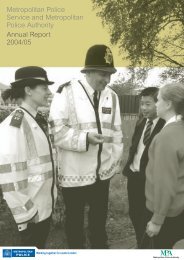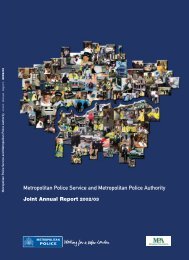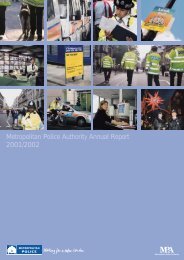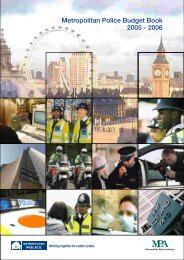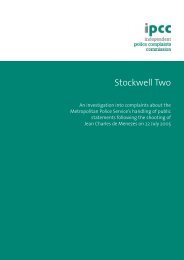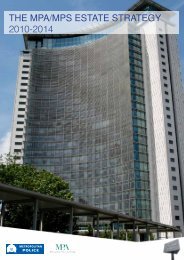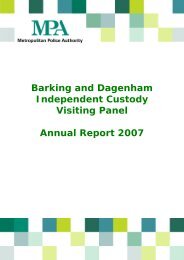Appendix 1: Efficiency and Effectiveness Review Programme ...
Appendix 1: Efficiency and Effectiveness Review Programme ...
Appendix 1: Efficiency and Effectiveness Review Programme ...
Create successful ePaper yourself
Turn your PDF publications into a flip-book with our unique Google optimized e-Paper software.
<strong>Efficiency</strong> <strong>and</strong> <strong>Effectiveness</strong> <strong>Review</strong> <strong>Programme</strong><br />
Overtime <strong>Review</strong><br />
Report Submitted to Finance, Planning <strong>and</strong> Best Value Committee<br />
17th January 2002
<strong>Efficiency</strong> <strong>and</strong> <strong>Effectiveness</strong> <strong>Review</strong> Program: Overtime<br />
1. Management Summary<br />
1. The MPS overspent its police overtime budget in the last financial year by approximately<br />
£20m. This was the second year in succession of growth in overtime spend, <strong>and</strong> forecasts for<br />
the current financial year show it continuing to grow.<br />
2. The MPS needs overtime in order to cope with the peaks <strong>and</strong> troughs of policing dem<strong>and</strong>s.<br />
However, the benefits of overtime can only be realised if it is kept under control.<br />
3. We propose a management control model with components that, if implemented, can help<br />
ensure that overtime in the MPS meets three fundamental criteria. It must be:<br />
a. Efficient – used only when essential, on activities that cannot be performed in core<br />
time<br />
b. Effective – that, once deployed, overtime resources get the desired results<br />
c. Economical – that it is paid at the lowest possible rate<br />
4. Efficient use of overtime concentrates on maximising the value of core time; on process<br />
improvements to reduce inefficient use of overtime, in the context of processing prisoners,<br />
for example; on management control <strong>and</strong> attention; <strong>and</strong> on the information support<br />
structures required to enable managers to take control.<br />
5. Effective use of overtime focuses on the value obtained from policing operations <strong>and</strong><br />
enquiries, particularly proactive operations, <strong>and</strong> the appropriateness of risk assessment <strong>and</strong><br />
planning, drawing in particular on examples from aid abstraction.<br />
6. Economical use of overtime can be made by reducing the rates at which overtime is paid<br />
through both regulatory changes <strong>and</strong> improved management of resources, including<br />
resources required for aid.<br />
7. All three areas of the model have been constructed from research across Specialist<br />
Operations, the Boroughs, TPHQ <strong>and</strong> other central units.<br />
8. The options we have explored <strong>and</strong> their associated savings/costs are split into those that<br />
require regulatory changes <strong>and</strong> those that do not. We have made recommendations only on<br />
those issues that do not require changes to national regulations. In the current climate of<br />
police reform, we believe it would be inappropriate to go further at this stage (though the<br />
MPA may wish to revisit a number of these regulatory issues later in 2002 when the national<br />
picture has become clearer). However, we have highlighted a small number of<br />
recommendations around allowances <strong>and</strong> their administration that could be implemented<br />
within the existing framework of national regulations.<br />
9. Aside from regulatory changes, however, the cornerstone of any major reduction in<br />
overtime expenditure is improved management attention <strong>and</strong> scrutiny. We have seen some<br />
excellent examples of managers who have got this right in the MPS, <strong>and</strong> have reaped the<br />
rewards in terms of reductions in overtime spend; however, we have also seen examples<br />
where management has been rather less tight.<br />
10. The potential savings opportunities we have identified range from c.£14.8-£20.5m for those<br />
recommendations not requiring regulatory changes to c.£0-£32m for those requiring<br />
regulatory reform. It should be noted that, if made, changes requiring regulatory reform<br />
© Accenture 2
<strong>Efficiency</strong> <strong>and</strong> <strong>Effectiveness</strong> <strong>Review</strong> Program: Overtime<br />
would impact on those not requiring regulatory reform, thus<br />
lowering slightly the final savings range from £0-32m. It should also be noted that the above<br />
outlined savings ranges are gross figures, <strong>and</strong> not inclusive of costs involved in<br />
implementing these changes.<br />
11. The systems, skills-base <strong>and</strong> cultural change required to elicit maximum improvement in the<br />
use of overtime will require time, strong leadership <strong>and</strong> commitment. Effective project <strong>and</strong><br />
journey management will, as ever, be critical to the successful delivery of such change.<br />
© Accenture 3
<strong>Efficiency</strong> <strong>and</strong> <strong>Effectiveness</strong> <strong>Review</strong> Program: Overtime<br />
2. Introduction<br />
1. The MPS spent c.£95m on police overtime (excluding additional officer allowances) during 2000-<br />
01 against a budget of c.£75m. The growth in spend has accelerated markedly over the last few<br />
years <strong>and</strong> projections for spend this year are even higher. Whilst the circumstances under<br />
which overtime is paid <strong>and</strong> the rates are dictated by National Police Regulations, there is<br />
nevertheless considerable scope for individual managers to influence the amount of money<br />
spent on overtime. In the MPS, the distribution of expenditure varies considerably between<br />
units <strong>and</strong> individual officers. Full details of the variation between units are included in<br />
Attachment 1.<br />
2. The <strong>Efficiency</strong> <strong>and</strong> <strong>Effectiveness</strong> Project Board has engaged Accenture to undertake a review to<br />
determine how the management <strong>and</strong> control of overtime could be improved without<br />
undermining operational effectiveness. As requested, the review concentrates on police<br />
overtime except where otherwise stated. In fact, the management model we propose will apply<br />
equally to civilian overtime, although the regulations governing the latter are slightly less<br />
complex than for police. It should also be noted that no attempt has been made to quantify<br />
potential benefits of civilian improvement opportunities.<br />
3. It is difficult to envisage the MPS existing without overtime. Given the structure, organisation<br />
<strong>and</strong> priorities of the force, overtime is essential to meeting the policing dem<strong>and</strong>s in the capital.<br />
In fact, overtime can be both an efficient <strong>and</strong> effective method of resourcing in an environment<br />
where dem<strong>and</strong> comes in peaks <strong>and</strong> troughs <strong>and</strong> where staff may need to be incentivised to meet<br />
such peaks. A ban on all overtime would therefore be counter-productive.<br />
4. However, these advantages of overtime can only be realised if it is used appropriately <strong>and</strong><br />
managed carefully. There are two pre-requisites for achieving this: firstly, core time must be<br />
used as a priority, <strong>and</strong>, secondly, overtime must only be used to remunerate those roles for<br />
which it is appropriate.<br />
5. Once these criteria are satisfied, it is essential that overtime is used (i) efficiently, (ii) effectively<br />
<strong>and</strong> (iii) economically. These requirements can only be met themselves if an adequate control<br />
regime is in place, characterised by: a robust performance management framework which<br />
encapsulates an evaluation of this control; appropriate IT <strong>and</strong> financial systems with processes<br />
providing accurate <strong>and</strong> timely management information; <strong>and</strong> enforcement by a high level of<br />
management attention <strong>and</strong> commitment rooted in appropriately aligned budgets <strong>and</strong><br />
responsibilities.<br />
6. Our research has revealed evidence of the above essential practice in the MPS; with the<br />
management <strong>and</strong> control of overtime improving as a result. However, this only applies in<br />
certain parts of the organisation. In other words, the MPS knows how to manage <strong>and</strong> control overtime<br />
– but it is not doing so consistently across the organisation.<br />
7. The review is based on a combination of qualitative <strong>and</strong> quantitative analysis. We have<br />
conducted research in a large number of OCUs - across SO, boroughs <strong>and</strong> central TP - including<br />
interviews with a range of internal <strong>and</strong> external stakeholders (a full list of interviewees is in<br />
Attachment 2). We would like to place on record an acknowledgement of the helpfulness <strong>and</strong><br />
openness that we have encountered from all sections of the force <strong>and</strong> our gratitude for both<br />
assistance to date <strong>and</strong> offers to help in the future. We have nevertheless encountered a great<br />
© Accenture 4
<strong>Efficiency</strong> <strong>and</strong> <strong>Effectiveness</strong> <strong>Review</strong> Program: Overtime<br />
many problems collecting quantitative data from around the<br />
organisation. As our report details, there is a major shortage of electronic data relating to<br />
overtime in the force, which is not only a major problem when conducting reviews such as this<br />
(<strong>and</strong> identifying figures for savings opportunities), but, crucially, is inhibiting many managers<br />
from doing their jobs effectively in relation to budget management. In an attempt to counter<br />
this we have employed a range of primary research techniques including surveys <strong>and</strong><br />
widespread manual sampling of paper records. The extent to which facts <strong>and</strong> figures relating<br />
to overtime are unavailable to management has been highlighted recently by requests we have<br />
received from MPS personnel, with responsibility for analysing overtime, asking us to share our<br />
data!<br />
8. Finally, it should be noted that the review started in the same week as the terrorist attack on the<br />
World Trade Center, a coincidence that has had a number of consequences for our review. As<br />
mentioned above, it has made the task of data collection more difficult, since the systems <strong>and</strong><br />
individuals most able to generate data for us are the very same that have been in such dem<strong>and</strong><br />
for information relating to Operation Calm. It has also, to some extent, changed the nature <strong>and</strong><br />
terms of the debate around overtime <strong>and</strong> budget management in general. On the positive side it<br />
has raised the profile of overtime, prompting many people to take a closer look at overtime in<br />
their own unit; the review has therefore been as relevant as ever. On the challenges side,<br />
however, there have inevitably been more people within the MPS reviewing overtime<br />
themselves <strong>and</strong> ‘joining up’ with them all has not always been possible.<br />
9. Our data <strong>and</strong> analyses apply generally to a pre-September 11 th world, unless otherwise stated in<br />
the report. However, it is in times of exceptional policing dem<strong>and</strong>s that the risks of ‘losing<br />
control’ of overtime are greatest, <strong>and</strong> the need for control measures along the lines that we<br />
suggest are themselves highest.<br />
3. Efficient use of core time <strong>and</strong> overtime<br />
What do we mean by ‘efficient’?<br />
10. Efficient overtime is that which is deemed absolutely essential, based on the hypothesis that<br />
overtime should not be spent on activities that could be performed in core time.<br />
Summary of current practice<br />
11. Our research has revealed many examples of what we would term an unacceptable use of<br />
overtime. We have also, however, uncovered examples of good practice where the level of<br />
unacceptable overtime has been reduced through certain repeatable measures. There are a<br />
number of dimensions to the problem:<br />
Core time not being effectively used<br />
12. Since new overtime management regimes have been put in place in Serious Crime Group<br />
(South), Hammersmith CID <strong>and</strong> SO7 Serious <strong>and</strong> Organised Crime, overtime expenditure has<br />
been reduced by 75%, 58% <strong>and</strong> 27% respectively. Senior managers in these units have said that<br />
this has been achieved with little discernible impact on performance. The inference can<br />
therefore be made, <strong>and</strong> has been confirmed by some of the managers, that core time was not<br />
previously being effectively used. The measures taken are described below, but a key theme has<br />
been working ‘smarter’, including asking testing questions of staff about whether overtime<br />
really is essential.<br />
© Accenture 5
<strong>Efficiency</strong> <strong>and</strong> <strong>Effectiveness</strong> <strong>Review</strong> Program: Overtime<br />
Process improvements to reduce inefficient use of overtime<br />
13. The pie charts in Attachment 1 show the activities on which overtime is spent. From both data<br />
<strong>and</strong> interviews we identified two of these activities as c<strong>and</strong>idates for process improvements to<br />
reduce the pressure on core time <strong>and</strong> consequently reduce the dem<strong>and</strong> for overtime, namely<br />
court attendance <strong>and</strong> prisoner processing.<br />
14. The amount of overtime spend on courts is relatively small at £1.8m, but the issue is an<br />
important one to boroughs as it represents a key portion of their core <strong>and</strong> overtime resource that<br />
is largely out of their control. Adding to the frustration is the small amount of time officers<br />
actually spend giving evidence (between 9% <strong>and</strong> 14% according to a recent National Trials<br />
Issues Group report) 1 . The main reason for officers attending courts on overtime is the inability<br />
of trial dates to accommodate officers’ rostered work patterns. The root causes differ between<br />
Magistrate <strong>and</strong> Crown Courts, with BOCUs in particular able to exert a greater influence over<br />
the scheduling activities of Magistrate Courts, <strong>and</strong> therefore bearing a greater degree of<br />
responsibility in such cases. Crown Court protocols tend to be less flexible, as Attachment 5<br />
details.<br />
15. There is considerable variation in the average spend per officer on Magistrate Court overtime<br />
across the boroughs, <strong>and</strong> our research has begun to uncover some best practice in this area<br />
centring on the relationship between a BOCU CJU Manager <strong>and</strong> the Magistrate Court staff <strong>and</strong><br />
also the devolution of court aid budget to the CJU. The new Greater London Magistrate Courts<br />
Association is determined to tackle the issue of joined-up working with the police <strong>and</strong> the<br />
climate for change would seem to be improving. There are nevertheless measures that<br />
boroughs can take to reduce overtime. Included in our recommendations is a proposal to<br />
examine ways to improve the utilisation of officer time while on duty. Examples of this might<br />
include computer connections from courts into the MPS network to enable them to undertake<br />
paperwork, or the use of pagers allowing officers to be ‘on call’ whilst continuing with<br />
operations.<br />
16. Prisoner processing represents a larger target, however, consuming c.£10m of borough<br />
overtime in FY00. Attachment 4 describes in detail the current situation, the methodology <strong>and</strong><br />
analysis we have employed. Guided by qualitative material from interviews initially, we<br />
concentrated our efforts on mechanisms for potentially reducing key blockages in the system;<br />
these included the ‘dead’ time officers spend waiting for third parties, <strong>and</strong> the broader<br />
efficiencies allegedly represented by dedicated custody arrest support teams (CASTs).<br />
17. Our findings offer evidence that whilst ‘appropriate adult’ schemes represent an important<br />
efficiency gain, the benefits of CASTs are not so universal. Whilst in certain situations <strong>and</strong><br />
environments they can realise substantial benefits, any attempt to implement them forcewide,<br />
could actually increase overall prisoner processing costs. We recommend that an evaluation,<br />
based on the draught ready reckoner proposed in Attachment 4, be conducted before any CAST<br />
implementation.<br />
Management control <strong>and</strong> attention is the cornerstone of any improvement<br />
1 Police <strong>Review</strong> vol. 109 no. 5646<br />
© Accenture 6
<strong>Efficiency</strong> <strong>and</strong> <strong>Effectiveness</strong> <strong>Review</strong> Program: Overtime<br />
18. Process improvements can only go so far in reducing levels of<br />
unacceptable overtime. The most important factor by far, <strong>and</strong> raised in almost every interview<br />
we have conducted, is management attention <strong>and</strong> supervision. Not only does improved<br />
supervision generate substantial savings in <strong>and</strong> of itself, it can have the effect of magnifying<br />
other efficiency savings, for example, in the processing of prisoners.<br />
19. Previous reviews of overtime in the Met have highlighted the role of management at every level<br />
as being central to good overtime management, <strong>and</strong> have drawn attention to the deficiencies<br />
that exist in places (see recent reports by MPA Internal Audit <strong>and</strong> MPS Inspectorate). Indeed, in<br />
their report of February 2001 (based on a project spanning back to August 1999), IA conclude:<br />
“In our opinion, there are a number of weaknesses in the system used to authorise <strong>and</strong> pay overtime to<br />
police officers. In particular, there are inadequate <strong>and</strong> ineffective st<strong>and</strong>ards of supervision of duty <strong>and</strong><br />
overtime documentation […] There are also inadequate controls over the processing of overtime.” This<br />
confirms the conclusion we made in the introduction, that the Met know how to manage<br />
overtime – they are just not doing so consistently.<br />
20. The aforementioned reductions in overtime spend in particular OCUs have been achieved by<br />
management employing very similar methods to one another. These are detailed in our<br />
recommendations below <strong>and</strong> in Attachment 3, but centre on holding officers <strong>and</strong> other<br />
managers to account for overtime spend, authorisation according to a strict policy of acceptable<br />
use <strong>and</strong> closer supervision of the recording of overtime. This is particularly important in CID<br />
units.<br />
21. We believe that by extending such good practice across comparable units in the Met there are<br />
substantial savings to be made. Quantifying them is difficult <strong>and</strong> ‘intelligent extrapolation’ is<br />
required. We have presented potential savings in the form of ranges, which have been<br />
validated with relevant managers where possible. The logic behind the savings estimates<br />
below is detailed in Attachment 3.<br />
22. In many of the instances of good practice of which we have seen evidence the drive to reduce<br />
overtime has been self-initiated, with the primary motivation being a professional or ‘moral’<br />
one. Consensus among interviewees, <strong>and</strong> evidence from other industries, is very much that less<br />
conscientious managers will only make similar efforts to improve when they are in turn driven<br />
by their own managers <strong>and</strong> are truly held to account. Attention should therefore be given to<br />
fine tuning systems of sanction <strong>and</strong> reward to incentivised good budgetary management.<br />
Examples of this might include linking financial performance to appraisals <strong>and</strong> promotions,<br />
requiring OCU managers who overspend budgets by a certain percentage to justify the reasons<br />
to the MPA, etc.<br />
23. Effective leadership is an integral part of controlling overtime expenditure. The systemic<br />
behavioural changes required to control overtime will occur to a far greater extent once officers<br />
with proven records in both operational competence <strong>and</strong> budgetary management are promoted<br />
ahead of, for example, less fiscally proficient counterparts. Interviews with senior officers <strong>and</strong><br />
finance managers suggest there is currently insufficient emphasis on this area.<br />
24. Our research has shown that challenging overtime expenditure can be a lonely business,<br />
because saying ‘no’ is difficult when individual officers might st<strong>and</strong> to lose out. It is essential<br />
that managers can have confidence in the support of the organisation when challenging<br />
overtime.<br />
© Accenture 7
<strong>Efficiency</strong> <strong>and</strong> <strong>Effectiveness</strong> <strong>Review</strong> Program: Overtime<br />
25. Overall, many senior managers have highlighted the importance of<br />
greater scrutiny from the MPA <strong>and</strong> the difference it is already making; however, all expressed<br />
the need for it to be sustained beyond the current budgetary challenges.<br />
Information support enablers<br />
26. Managers cannot be expected to exert tight control of their overtime expenditure without access<br />
to accurate <strong>and</strong> timely management information. In all the examples of good practice we have<br />
seen, management information has been the key enabler. However, given some of their current<br />
recording arrangements, IT systems <strong>and</strong> financial management structures, however, this is<br />
impossible in some units.<br />
27. In our view, it is unacceptable that some of the highest spending units do not use the st<strong>and</strong>ard<br />
overtime management <strong>and</strong> recording tool, CARM. They cannot therefore produce MI at all in<br />
some cases without extensive manual labour, nor in other units in a format enabling inter-unit<br />
comparisons in others (see Attachment 7, our SO case study, for more detail on this). Whilst the<br />
suitability of CARM as a long term solution is not certain, in the short to medium-term it is<br />
essential that all units should use it.<br />
28. It is also unacceptable that overtime is recorded, authorised <strong>and</strong> processed in different ways<br />
around the force, particularly given previous recommendations from Internal Audit. This is in<br />
part a symptom of a lack of ownership of overtime management at the centre of the<br />
organisation.<br />
Reducing the pressure on core time through changes in operational policy<br />
29. There is another slightly more radical way to reduce the level of unacceptable overtime -<br />
through reducing the pressure on officers’ core hours. Several interviewees in both boroughs<br />
<strong>and</strong> SO complained that they were struggling to cope with dem<strong>and</strong> levels <strong>and</strong> were frustrated<br />
by having to pursue certain non-priority crimes that rarely resulted in a conviction, which they<br />
viewed as a waste of core time <strong>and</strong> a contributor to overtime. Particular frustration existed in<br />
relation to so-called ‘victimless’ crimes, such as credit card fraud, deception, making off without<br />
payment, shoplifting etc.<br />
30. Some boroughs have adopted local policies to help reduce this pressure on core time. In<br />
Hackney, for example, they have introduced a policy of screening deception cases through a<br />
scoring mechanism that helps determine whether or not they investigate it. Scores are<br />
attributed based on victim <strong>and</strong> offender profiles, victim numbers <strong>and</strong> value stolen/obtained.<br />
Since it is not possible to calculate an average amount of time spent investigating such cases it is<br />
not possible to quantify savings. However, in spite of an increase in the number of allegations,<br />
they investigated nearly 500 fewer offences in the first year of the scheme than in the previous<br />
year.<br />
31. The nature of this type of crime is such that investigations are time consuming due to<br />
complexity, due to the number of statements to be taken (e.g. bank staff, members of the public<br />
etc.) <strong>and</strong> due to the creation of exhibit lists. Removing the burden of investigating these crime<br />
types has allowed CID officers to concentrate on case work in core time, <strong>and</strong> has allowed the<br />
DCI “to manage resources more effectively <strong>and</strong> focus them towards priority crime”. He claims<br />
it has also been a major factor in getting CID overtime down from a £120k annual overspend to<br />
its budgeted level this year 2 .<br />
2 Figures from Hackney borough<br />
© Accenture 8
<strong>Efficiency</strong> <strong>and</strong> <strong>Effectiveness</strong> <strong>Review</strong> Program: Overtime<br />
32. An independent assessment of the Lambeth cannabis arrest policy pilot is due to be published<br />
shortly. However, information from the borough suggests that with any arrest / warning<br />
usually consuming two officers, a total of four hours of officer time is saved with every incident.<br />
Meanwhile, the recent relaxation of the law on cannabis possession is estimated to save over<br />
74,000 police officer hours per year 3 .<br />
3 Evening St<strong>and</strong>ard 24/10/01 (figures not validated here)<br />
© Accenture 9
<strong>Efficiency</strong> <strong>and</strong> <strong>Effectiveness</strong> <strong>Review</strong> Program: Overtime<br />
Recommendations on the efficient use of overtime<br />
Process improvements to reduce inefficient use of overtime - courts (see Attachment 5)<br />
1. Boroughs should take measures to reduce court overtime including:<br />
! Devolve courts aid budget to CJU manager<br />
! All OCUs should improve quality of MG10 completion to ensure courts have upto-date<br />
records of officers’ dates to avoid<br />
! Borough CJUs should establish closer links with Magistrates Courts<br />
! Better duties management of court abstractions to reduce time worked as<br />
overtime<br />
2. The MPS should examine methods of maximising officer time while on duty,<br />
including exploiting the use of technology to reduce ‘dead time’ in court<br />
3. Commissioner should address issue of officers attending Crown Courts <strong>and</strong><br />
police involvement in setting trial dates with judiciary <strong>and</strong> Home Office<br />
Process improvements to reduce inefficient use of overtime – prisoner processing (see Attachment 4)<br />
1. All boroughs should implement <strong>and</strong> maintain an appropriate adults scheme<br />
2. All boroughs should work to reduce the % of planned overtime on prisoner<br />
processing to less than 10% through better supervision, applying particularly to<br />
CID officers whose broader supervision is addressed in Attachment 3<br />
3. MPS should NOT implement custody arrest support teams (CASTs) force-wide<br />
<strong>and</strong> should instead apply our evaluation guide to identify where it would be cost<br />
effective.<br />
4. As part of its Information Strategy implementation, the MPS should consider a<br />
systematic re-evaluation of current custody systems to eliminate the widespread<br />
inefficiencies of non-cooperative information systems <strong>and</strong> reduce excessive<br />
burden of paperwork.<br />
5. Boroughs must place greater emphasis on cooperation between uniform beat <strong>and</strong><br />
sector teams in the h<strong>and</strong>over of prisoners between shifts.<br />
Improvements of systems <strong>and</strong> processes involved in management control <strong>and</strong> attention are the<br />
cornerstone of any improvement in efficiency of overtime use<br />
1. As a matter of urgency, managers on all OCUs should work to increase the level<br />
of supervision <strong>and</strong> scrutiny of overtime at all ranks. The following practices<br />
should be adopted:<br />
! Publish <strong>and</strong> enforce an acceptable use policy for overtime each OCU (<strong>and</strong><br />
explain to staff the reasons behind it)<br />
! ‘Intrusive’ management <strong>and</strong> greater questioning of essentiality/non-essentiality<br />
of O/T, encouraging people to work ‘smarter’<br />
! Closer supervision to ensure planned/casual overtime authorised <strong>and</strong> recorded<br />
correctly<br />
© Accenture 10
<strong>Efficiency</strong> <strong>and</strong> <strong>Effectiveness</strong> <strong>Review</strong> Program: Overtime<br />
! Clearly defined <strong>and</strong> enforced authorisation processes, escalating to SMT levels in<br />
short term <strong>and</strong> in longer term when individual managers overspend without<br />
justification; decisions should be based on both operational <strong>and</strong> financial<br />
considerations<br />
! Overtime to be authorised before it is worked (not retrospectively), with start <strong>and</strong><br />
finish times authorised <strong>and</strong> monitored (part-hours included)<br />
! Dip sampling of overtime records to ensure compliance<br />
! Overtime clerks to alert managers <strong>and</strong> refuse to process any records received<br />
without proper authorisation<br />
! Transparent, timely <strong>and</strong> accurate management information with provision of<br />
clear audit trails <strong>and</strong> accountability structures should be available <strong>and</strong> reviewed<br />
on a weekly <strong>and</strong> monthly basis<br />
! Clear channels of accountability need to be defined, with regular reporting on<br />
the operational <strong>and</strong> financial status of operations<br />
! Overtime should be a SMT priority <strong>and</strong> a regular agenda item<br />
! FRM/SRM should be a permanent SMT member on every OCU<br />
! Meetings to review a balanced scorecard considering budgetary as well as<br />
operational performance, including duty state auditing etc. , as a means of<br />
holding managers to account<br />
! Monitoring of officers earning high levels of overtime pay relative to their peers<br />
2. Thought should be given to fine tuning systems of incentives <strong>and</strong> sanctions for<br />
managers, including incorporating budget management into the appraisal <strong>and</strong><br />
promotion process.<br />
3. All managers should have the explicit support of their senior managers when<br />
challenging overtime expenditure within an OCU<br />
Information support enablers<br />
1. Short-term improvements to CARM are essential<br />
! CARM should be rolled out to all non-participating units based on business case<br />
of 01/11/01<br />
! A SQL server database for CARM should be implemented <strong>and</strong> placed on<br />
upgraded NT server to enable production of forcewide MI on overtime <strong>and</strong> duties<br />
that could be published on the intranet, as per CARM team business case of<br />
06/11/01<br />
! Consideration should be given to a pilot of a self-service model of CARM in SO<br />
units<br />
! Immediate consideration should be given to activity analysis <strong>and</strong> time/expense<br />
recording tools as medium term alternatives to CARM as part of KISSMET<br />
information strategy<br />
2. Ownership of overtime management should be assigned to a central unit (e.g. in<br />
P or F department) with responsibility for setting up <strong>and</strong> maintaining<br />
st<strong>and</strong>ardised systems <strong>and</strong> processes <strong>and</strong> to support local overtime management<br />
© Accenture 11
<strong>Efficiency</strong> <strong>and</strong> <strong>Effectiveness</strong> <strong>Review</strong> Program: Overtime<br />
Reducing the pressure on core time through changes in operational policy<br />
1. OCUs should consider setting local policy to prioritise certain offence types in<br />
order to maximise value of officers’ core time (e.g. a scoring system to screen<br />
crimes ‘in’ <strong>and</strong> ‘out’), whilst the Met as a whole should consider such policy<br />
declarations at force level <strong>and</strong>/or monitor <strong>and</strong> give support (if appropriate) to<br />
local managers<br />
© Accenture 12
<strong>Efficiency</strong> <strong>and</strong> <strong>Effectiveness</strong> <strong>Review</strong> Program: Overtime<br />
4. Effective use of overtime<br />
What do we mean by ‘effective’?<br />
33. Once we are confident that overtime is appropriate <strong>and</strong> an acceptable means of resourcing<br />
certain policing activity, it essential we know what we are getting for our investment – i.e.<br />
whether the expenditure on policing is ensuring sufficient results (in terms of outputs <strong>and</strong><br />
outcomes).<br />
34. Monitoring of the effectiveness of overtime needs to encompass the processes before <strong>and</strong> after<br />
the overtime is incurred, extending from initial risk assessment through to post-operation<br />
evaluation <strong>and</strong> knowledge capture.<br />
Summary of current practice<br />
35. The MPS invests a great deal of money on overtime, but finds it difficult to make clear <strong>and</strong><br />
consistent judgements on the return on that investment. In spite of some individual examples of<br />
good practice in the monitoring of individual proactive operations, for example, we were not<br />
able to assess claims of value for money given a lack of information about inputs, outputs <strong>and</strong><br />
outcomes. This manifests itself in a number of areas:<br />
Proactive policing, ‘enquiries’ <strong>and</strong> productivity<br />
36. Most boroughs set aside a proportion of their devolved overtime budget for proactive<br />
operations. This ranges, in the examples we have seen, from around £20k to £80k. Meanwhile,<br />
until recently Territorial Policing HQ have held a contingency fund from which boroughs are<br />
able to bid for proactive operations (a budget of c.£2.8m in 2001/02). All bids have to be<br />
submitted on st<strong>and</strong>ard Proactive Tasking Forms (PATs), which provide scope for bidders to<br />
record proposed costs <strong>and</strong> outcomes in advance <strong>and</strong> actual costs / outcomes after the event.<br />
37. The robustness of the pre- <strong>and</strong> post- operation evaluations of PATs appears to vary widely<br />
across the force, however. Costing information is not always included, although some boroughs<br />
(e.g. Sutton <strong>and</strong> Bexley) try to make it easier for managers by including a ‘ready reckoner’ tool<br />
for officer costs in their st<strong>and</strong>ard management information release. Debriefs do not always take<br />
into account a value for money judgement of any operation. In part this relates to the potential<br />
difficulties of measuring policing inputs, outputs <strong>and</strong> outcomes on anything but an individual<br />
basis – how can you make a value judgement about the relative benefits of widely differing<br />
crimes, their offenders <strong>and</strong> their victims? This is clearly an area that requires more work,<br />
starting in the first instance with work on alternative policing input measures to police numbers.<br />
38. In the short term, however, senior management need to decide whether proactive policing<br />
dependent upon overtime is sustainable in the current climate of overspend. The central TP<br />
budget has already been frozen, we underst<strong>and</strong>, <strong>and</strong> several boroughs have frozen theirs. Such<br />
a step clearly comes with a risk attached, given the assumption that proactive policing can<br />
reduce crime over time. It is also one of the few areas where any sort of business case is required<br />
for overtime resources, <strong>and</strong> in that sense its loss would be regretted by several managers we<br />
spoke to.<br />
39. The same problem of assessing effectiveness exists when attempting to assess ‘Enquiries’, a<br />
recording category on CARM that, as Attachment 1 shows, constitutes a large percentage of CID<br />
overtime in the boroughs. With current recording practices, it is almost impossible to identify<br />
the activities on which this overtime has been spent <strong>and</strong> consequently whether it has been<br />
© Accenture 13
<strong>Efficiency</strong> <strong>and</strong> <strong>Effectiveness</strong> <strong>Review</strong> Program: Overtime<br />
effective (see MPS Inspectorate Outturn report for more on<br />
Enquiries activity codes in CARM). This leaves scope for ineffective (<strong>and</strong> indeed inessential /<br />
unacceptable) overtime to be worked without very close supervision.<br />
40. This lack of robustness in post-operation evaluation inevitably means there is often a failure to<br />
learn from past practice, good <strong>and</strong> bad, <strong>and</strong> that when the knowledge in people’s heads moves<br />
on with them, newcomers are left to learn by making the same mistakes. Such a lack of<br />
knowledge management is a structural h<strong>and</strong>icap to effective overtime management.<br />
Planning <strong>and</strong> risk management<br />
41. It is at the stage of operation planning that such knowledge is essential to enable the most<br />
accurate risk assessments to be made based on past practice. This issue is crystallised in the<br />
MPS by the issue of aid abstractions.<br />
42. The subject of aid is dealt with fully in Attachment 6 <strong>and</strong> is clearly a controversial area, one in<br />
which the sense of a centre/borough split is particularly acute. One accusation from the<br />
boroughs is that risk assessments made by the centre include an unnecessary ‘comfort blanket’<br />
figure; boroughs are in turn accused of not managing their duties (cost) effectively in response<br />
to central dem<strong>and</strong>s for resources.<br />
43. We deal with the second issue later in the report. We also made a decision to avoid exploring in<br />
depth the methodologies of risk assessment employed by gold comm<strong>and</strong>ers <strong>and</strong> CO11<br />
Planning. This is in part because a review of this dimension of aid abstraction is currently being<br />
undertaken by TPHQ, but also because the decisions made are necessarily made with<br />
operational objectives in mind, something we are not best placed to comment on. What we can<br />
say from our research, however, is that there could almost certainly be improvements made in<br />
the way in which knowledge is managed across events <strong>and</strong> operations <strong>and</strong> in the recording <strong>and</strong><br />
monitoring of policing inputs, outputs <strong>and</strong> outcomes.<br />
44. There is also potentially a structural impediment to effective use of resourcing on public order<br />
aid, <strong>and</strong> indeed other types of aid such as POLSA search officers, relating to the misalignment of<br />
budgets <strong>and</strong> responsibilities. Whether or not a ‘comfort blanket’ exists in making risk<br />
assessments (not just in terms of overall officer numbers, but when they are required to start<br />
<strong>and</strong> finish duty), experience (<strong>and</strong> intuition) tells us that when one party ‘spends’ a resource <strong>and</strong><br />
another ‘pays’ for that resource, end-to-end costs tend to be higher than when one party is<br />
spending its own budget.<br />
45. There is apparent evidence that this has existed in relation to armed hospital guards provided<br />
by SO16 for activity on boroughs. Previously, we have been told, a borough manager (usually<br />
Supt Ops) could request a guard for an individual hospitalised on the borough, having<br />
conducted their own risk assessment, <strong>and</strong> SO16 would pay the officers’ overtime. There was a<br />
sense in some quarters that the misalignment of budgets was prompting requests of guards<br />
when not absolutely necessary. To counter this, authorisation from an ACPO officer became<br />
m<strong>and</strong>atory for all guard events after 24 hours. Prior to this move, from pay periods two to<br />
eight, the average monthly overtime bill to SO16 was over £96k; in pay period nine it was less<br />
than £14k.<br />
46. It is clear from our work that escalation of authority is a key factor in overtime reduction. One<br />
hypothesis mentioned to us in explanation is that senior officers are better placed to make<br />
judgements on risk assessment with confidence, based both on professional experience <strong>and</strong> the<br />
security of a more senior position. As one manager told us in relation to working smarter in<br />
© Accenture 14
<strong>Efficiency</strong> <strong>and</strong> <strong>Effectiveness</strong> <strong>Review</strong> Program: Overtime<br />
SO1(4), cutting back on one’s comfort zone in decision-making is<br />
both possible <strong>and</strong> acceptable (“we need to be in the business of risk management”).<br />
47. This logic could well be applied again to the aid arena, where the start <strong>and</strong> finish times of<br />
officers can have considerable overtime implications due to regulations about the start of the<br />
working day (e.g. a minimum of four hours overtime plus one hour travelling time at a rate of<br />
double time must be paid to an officer working as little as fifteen minutes before the official start<br />
of the working day, if the previous day was a rest day or public holiday). This is dealt with in<br />
more detail in Attachment 6, but summary recommendations are included below.<br />
48. In addition to increased supervision <strong>and</strong> escalating the level of authorisation, possibilities exist<br />
for more radical restructuring to align budgets <strong>and</strong> responsibility to boost the effectiveness of<br />
overtime. This is discussed in more detail in Attachment 6 in the context of aid, although<br />
summary recommendations are included below.<br />
49. The misalignment problem is also addressed in Attachment 7 on SO, an area of the organisation<br />
where some realignment of budgets <strong>and</strong> responsibility is desirable.<br />
© Accenture 15
<strong>Efficiency</strong> <strong>and</strong> <strong>Effectiveness</strong> <strong>Review</strong> Program: Overtime<br />
Recommendations on effective use of overtime<br />
Proactive policing, ‘enquiries’ <strong>and</strong> productivity<br />
1. MPS should ensure that all major operations, including proactive operations, are subject to<br />
post-operational evaluation studies within a framework of cost effectiveness as well as<br />
achievement of operational objectives, in addition to ensuring the current business case<br />
process is adhered to. This should also facilitate the evaluation of proactive operations as a<br />
whole in order to be better placed to assess the return on investment of overtime<br />
2. The MPS should design more appropriate measures of operational policing, in terms of<br />
inputs, outputs <strong>and</strong> outcomes, to assist in business case development <strong>and</strong> evaluation<br />
3. Given the lack of robust information on the outcomes of proactive policing, <strong>and</strong> given the fact that it<br />
is often the first budget to be frozen, Project Board might wish to consider a reduction in this<br />
dimension of the overtime budget for next year<br />
Planning <strong>and</strong> risk management<br />
1. Managers need to have access to the information they need to make informed decisions<br />
about risk, including access to potential costs, <strong>and</strong> should be confident of the support of<br />
senior managers when using professional judgement in risk assessment.<br />
2. The MPS should consider options to improve the provision of public order <strong>and</strong> POLSA aid<br />
including a realignment of budget <strong>and</strong> responsibility with central budgets being used to<br />
‘purchase’ borough officers; boosting supply of trained officers <strong>and</strong> holding decision<br />
makers to account for the cost as well as operational implications of decisions<br />
3. The MPS should consider a number of options for reducing spend incurred at the start of<br />
the working day, including:<br />
! Revising the current practice of home station parade for specific public order events<br />
! The provision of appropriate information to public order comm<strong>and</strong>ers to enable them to<br />
cost the effects of their decisions in real time – both in the planning of events <strong>and</strong> upon<br />
deployment<br />
! Replacing operational feeding with refresher allowances<br />
! Replacing operational feeding with packed lunches <strong>and</strong> receipted expenses<br />
© Accenture 16
<strong>Efficiency</strong> <strong>and</strong> <strong>Effectiveness</strong> <strong>Review</strong> Program: Overtime<br />
5. Economical use of overtime<br />
What do we mean by economical?<br />
50. Once the tests of efficiency <strong>and</strong> effectiveness have been passed, a third criteria needs to be met<br />
to ensure best practice overtime management - is overtime being paid at the lowest possible<br />
rate?<br />
Summary of current practice<br />
51. This is certainly not always the case in the MPS, or the police service as a whole. Rules around<br />
the rates at which overtime is paid are fixed by police regulations <strong>and</strong> relate primarily to the<br />
notice periods that officers are given (see Attachment 8 on Terms <strong>and</strong> Conditions for full<br />
details). In the light of current police reform work, however, we have proposed a number of<br />
changes to terms <strong>and</strong> conditions that could make the payment of overtime more economical.<br />
Even within existing regulations however, there is still considerable scope for managers <strong>and</strong><br />
OCUs to control the rate at which overtime is paid by virtue of the notice period <strong>and</strong><br />
planned/casual overtime distinction. We have again chosen to focus on aid abstractions to<br />
demonstrate the latter point, before moving on to terms <strong>and</strong> conditions.<br />
Aid abstractions – improved duties management<br />
52. The analysis in the aid Attachment 6 shows the extent of variation in rates at which different<br />
boroughs have supplied aid to the centre. Our research shows that this can be influenced to a<br />
significant degree by the practice in borough duties/ops offices. The easiest option when<br />
resourcing an aid request can sometimes be to recall officers from rest days, particularly if short<br />
notice has been given to the borough in the first place. This inevitably leads to payments to<br />
officers at double time. We have seen evidence of good practice across the force (e.g.<br />
Paddington, Bexley, Hackney) that places so-called ‘less than eights’ officers at the bottom of the<br />
list, who are only recalled at last resort. Indeed, of the 17 of duties offices that responded to our<br />
survey, 10 required SMT authorisation before any such rest days were cancelled. However,<br />
there are other OCUs who do not have protocols in place for resourcing aid, <strong>and</strong> for whom<br />
cancelling weekly leave is nearer a first resort. We estimate significant savings can be made on<br />
boroughs by tightening up on the one area of aid abstraction that they can influence. The<br />
devolution of aid overtime budgets to duties/ops office managers is another example of good<br />
practice in this regard.<br />
Aid abstractions – improved notice from centre to BOCUs<br />
53. A borough’s ability to minimise the rate at which overtime is paid to officers on aid can be<br />
heavily influenced by the notice period received for the aid from CO11 Resourcing at the centre.<br />
In many cases, this notice period reflects the notice given to the MPS as a whole; after all, the<br />
Public Order Act requires only six days notice to be given to the police about a planned<br />
demonstration, which is instantly ‘less than eight’ <strong>and</strong> heavily reduces a borough’s ability to<br />
avoid cancelling weekly leaves (even to backfill for core officers who have been sent on aid,<br />
itself an example of good practice). Although the MPS needs to police every demo, even those<br />
for which they receive less than the minimum notice, a change to legislation would certainly of<br />
benefit.<br />
54. Notice periods are not recorded electronically, so, data collection is difficult. However, our<br />
manual sampling has shown that 7 out of 48 events requiring borough resources for aid were<br />
received by CO11 with more than 15 days notice but the boroughs were notified with less than<br />
eight days notice. This means that the opportunities for boroughs to supply aid, or backfill for<br />
officers on aid, at anything less than double time is severely reduced. In Attachment 6 on aid<br />
© Accenture 17
<strong>Efficiency</strong> <strong>and</strong> <strong>Effectiveness</strong> <strong>Review</strong> Program: Overtime<br />
we estimate the potential savings that could be made by speeding<br />
up the turnaround of notifications.<br />
55. This is something CO11 acknowledge to be an issue, <strong>and</strong> they will need the support of the<br />
organisation (in IT provision for instance) to help them meet the dem<strong>and</strong> for the fastest possible<br />
notification turnarounds. The need to incentivise the centre to maximise the notice given to<br />
boroughs <strong>and</strong> other supplying OCUs is tackled in our proposals for reform in the attachment.<br />
National notice periods<br />
56. The whole notice periods debate is conducted within the rules laid down by National Police<br />
Regulations. With decisions on notice periods <strong>and</strong> other regulatory changes resting with the<br />
Police Negotiating Board <strong>and</strong> the Government, it is not appropriate for us to make<br />
recommendations on this issue at this stage. However, we have outlined some costed<br />
alternatives to current terms <strong>and</strong> conditions that the MPS might wish to revisit later this year in<br />
the light of any decisions from the PNB. For instance, Attachment 8 explains in detail our<br />
calculations of the potential savings of tightening the notice period thresholds from fifteen <strong>and</strong><br />
eight days, to eight <strong>and</strong> five days. In the units that use CARM alone, this would amount to over<br />
£11m annually. It is also a proposal that has met with broadly favourable responses from our<br />
interviewees.<br />
57. Notice periods that affect overtime payment rates are very unusual across industries, however,<br />
<strong>and</strong> many comparable organisations such as the London Ambulance Service <strong>and</strong> the NYPD pay<br />
overtime at st<strong>and</strong>ard rates. In Attachment 8 we have mapped out some options, drawing on<br />
benchmarks from comparable organisations, that would improve the economics of overtime<br />
payment in the MPS.<br />
Removing duties from overtime regime<br />
58. We believe that there are certain roles within the MPS for which overtime is not an appropriate<br />
means of remuneration. One unit in the MPS, SO14(2) within Royalty Protection, does not pay<br />
overtime to its constables <strong>and</strong> sergeants for the majority of their work, <strong>and</strong> instead pays an<br />
allowance deemed more appropriate (Special Escort Allowance under Police Regulation 61).<br />
Not only can this have benefits for staff, but it can increase control <strong>and</strong> forecasting ability <strong>and</strong><br />
prove more cost effective in units who overtime spend is among the most difficult to control.<br />
We believe there are several other roles <strong>and</strong> units within the MPS for which alternative means of<br />
remuneration would be more appropriate (see <strong>Appendix</strong> 7).<br />
Allowances<br />
59. One final change in terms <strong>and</strong> conditions that we would see as essential is the replacing of<br />
allowances with receipted expenses. We have not examined allowances in general, only the<br />
principal one relating to overtime – refreshment / subsistence allowance (see Attachment 9 for<br />
more details). We estimate the MPS could save £2.2m through the requirement that expense<br />
payments only be made upon presentation of receipts. A number of boroughs within the Met<br />
have already proposed such an arrangement we underst<strong>and</strong>, whilst the National Crime Squad<br />
are intending to make a similar move. We have been assured that these changes could be<br />
implemented using existing forms, systems <strong>and</strong> processes.<br />
Shift systems<br />
60. During our research we have heard many accounts of how different shift patterns can impact on<br />
overtime expenditure. A range of options have been suggested as potential means of reducing<br />
overtime: from a return to the four shift system, to flexible twelve hour days, to st<strong>and</strong>ard five<br />
shift systems with spare shifts split <strong>and</strong> working late turn. It was not felt appropriated or<br />
© Accenture 18
<strong>Efficiency</strong> <strong>and</strong> <strong>Effectiveness</strong> <strong>Review</strong> Program: Overtime<br />
feasible to consider these issues in depth as part of the Overtime<br />
<strong>Review</strong>. We know from the Work Scheduling Unit at Merseyside Police that a pilot of the<br />
‘Ottawa’ system resulted in a 14% reduction in overtime; meanwhile, as Attachment 10 shows,<br />
we conducted a brief comparison of the Hackney shift pattern with near neighbours to test its<br />
supposed advantages, which generated promising results requiring further testing. Given the<br />
relevance to overtime, we are recommending that the planned review of shift patters in Tranche<br />
2 be brought forward to the start of the tranche.<br />
Recommendations on economical use of overtime<br />
Aid abstractions - improved duties management<br />
1. OCUs should consider the following in relation to duties:<br />
! Devolve local aid budgets to ops/duties office managers <strong>and</strong> hold them accountable for it<br />
! Put in place duties/ops offices protocol dictating the order in which officers are supplied<br />
for aid to minimise costs – with cancelled weekly leaves as last resort<br />
! Duties/ops offices should maintain a decision log spreadsheet of aid requests <strong>and</strong> their<br />
responses with justification<br />
! Escalate authorisation to cancel less-than-8s to SMT member<br />
AND/OR<br />
1. Implement aforementioned aid resource purchasing arrangement<br />
Aid abstractions - improved notice from centre to BOCUs<br />
1. Work should be undertaken to help CO11 increase notice periods, including:<br />
! CO11 should be bound by an SLA with boroughs regarding the speed with which<br />
requests for aid resources are processed – thereby maximising the boroughs’ chances of<br />
supplying aid at lower rates<br />
! CO11 should be included in the CARM roll out programme<br />
! CO11 should be supported in their attempt to replace MSS with OTIS email messaging<br />
! The MPS might raise with central government the problems caused by minimum six day<br />
notice period under Public Order Act<br />
! Notice period fields should be completed when all event details are entered into POSMIS<br />
Removing duties from overtime regime<br />
1. Overtime should be substituted with an appropriate allowance, calculated <strong>and</strong> graded on<br />
a given set of criteria such as level of risk, responsibility, skills, disruption <strong>and</strong> overtime<br />
hours worked in the following units:<br />
! SO12(a), SO14, SO16, SO17<br />
! Consideration should also be given to its implementation in SO7, SO10 <strong>and</strong> 11 <strong>and</strong><br />
the TSG<br />
Shift system<br />
© Accenture 19
<strong>Efficiency</strong> <strong>and</strong> <strong>Effectiveness</strong> <strong>Review</strong> Program: Overtime<br />
1. The review of shift systems in Tranche 2 should brought forward to the beginning of the<br />
programme <strong>and</strong> should include an evaluation of the impact of various shift systems on<br />
overtime based on current MPS <strong>and</strong> national good practice– including flexible shifts<br />
patterns, split shift systems etc.<br />
Allowances<br />
1. Replace Travel <strong>and</strong> Subsistence Allowance with receipted expenses<br />
2. Examine other allowances, overtime-related or otherwise, with a view to replacing with<br />
receipted expenses<br />
© Accenture 20
<strong>Efficiency</strong> <strong>and</strong> <strong>Effectiveness</strong> <strong>Review</strong> Program: Overtime<br />
6. Summary of financial implications<br />
FOCUS<br />
AREA<br />
SUMMARY of QUANTIFIED<br />
RECOMMENDATIONS<br />
INDICATIVE<br />
SAVINGS<br />
REGULATION<br />
CHANGE<br />
Extension of best practice to non-CID<br />
£1.75m<br />
N<br />
borough units<br />
Extension of best practices to all Borough<br />
£2.3m<br />
N<br />
Management<br />
Attention<br />
CID units<br />
Extension of best practices to selective<br />
£0.5m<br />
N<br />
central TP units<br />
Extension of best practices to all SO units £3.5m-£5.25m N<br />
Improved recording of casual overtime £2.25m N<br />
Sub-Total of Potential Savings<br />
£10.3m - £12.05m<br />
Implementation of appropriate adult<br />
Prisoner scheme<br />
Processing 4 Reduction in level of planned overtime in<br />
prisoner processing<br />
Sub-Total of Potential Savings<br />
£0.7m<br />
£0.5m<br />
£1.2m<br />
Reduction in Aid overtime at start of<br />
£0.3-£0.5m<br />
N<br />
working day<br />
Aid Improve notice periods £0.15m N<br />
Improve duties management £0.3m - £0.75m N<br />
Reduction in POLSA overtime £0.2m N<br />
Sub-Total of Potential Savings<br />
£0.95-£1.6m<br />
N<br />
N<br />
Extension of Regulation 61 Allowance to<br />
£0 –£3.3m N<br />
selected units<br />
Associated savings in administration of<br />
£0.12m<br />
N<br />
Terms &<br />
overtime<br />
Conditions 5<br />
Flat rate overtime payments at Time £32m Y<br />
Public Holiday rate at Time £7m Y<br />
Public Holiday Rate at Time & a half £3.8m Y<br />
Change in notice periods £11m Y<br />
Sub-Total of Potential Savings 6<br />
£0m - £35.42m<br />
Allowances<br />
Replacement of subsistence allowance<br />
with receipt/self-certification<br />
£2.2m<br />
Sub-Total Savings NOT Requiring Regulatory Changes £14.8m -<br />
£20.5m<br />
Sub-Total Savings Requiring Regulatory Changes<br />
£0m-£32m<br />
N<br />
4 In addition to these proposals, refraining from a blanket implementation of CASTs forcewide could save up<br />
to £5m depending on the extent of current proposals<br />
5 Note the inclusion of potential savings relating to changes in the rate of payment for overtime is for<br />
indicative purposes only; we are not making recommendations but identifying areas the MPS might wish to<br />
revisit in the light of the current work by the Police Negotiating Board in this area.<br />
6 Clearly there is an element of double counting here. If all the non-regulatory changes were made the level<br />
of overtime would fall <strong>and</strong> the amount saved from regulatory changes would fall. However, modeling this is<br />
complex <strong>and</strong> would require more work if changes in overtime rates, for instance, were deemed likely. Some<br />
overlap between management attention savings <strong>and</strong> notice period savings would also apply.<br />
© Accenture 21
<strong>Efficiency</strong> <strong>and</strong> <strong>Effectiveness</strong> <strong>Review</strong> Program: Overtime<br />
Summary of Costs<br />
FOCUS<br />
AREA<br />
Information<br />
Support<br />
SUMMARY of QUANTIFIED<br />
RECOMMENDATIONS<br />
INDICATIVE COSTS<br />
REGULATION<br />
CHANGE<br />
CARM should be rolled out to all nonparticipating<br />
units based on business<br />
case of 01/11/01<br />
£48k - £71k N<br />
A SQL server database for CARM<br />
£10k N<br />
should be implemented <strong>and</strong> placed on<br />
upgraded NT server to enable<br />
production of forcewide MI on overtime<br />
<strong>and</strong> duties that could be published on<br />
the intranet, as per CARM team<br />
business case of 06/11/01<br />
TOTAL COSTS £58 - £81k<br />
© Accenture 22
<strong>Efficiency</strong> <strong>and</strong> <strong>Effectiveness</strong> <strong>Review</strong> Program: Overtime<br />
7. Making it happen<br />
Taken together, our recommendations will involve an extensive programme of change for the MPS<br />
affecting the organisation’s systems, skills base <strong>and</strong> culture. Such changes are complex <strong>and</strong> time<br />
consuming, <strong>and</strong> cannot be achieved without significant levels of investment <strong>and</strong> a degree of realism<br />
about what can be achieved by when.<br />
The next stage is for the MPS to develop the recommendations contained in this report into a<br />
detailed action plan for implementation. However, to provide an initial steer for this process, we<br />
have included a high level map of an implementation programme here.<br />
We recommend a phased approach to implementing the changes, concentrating first on getting the<br />
foundations in place in 2001/02, <strong>and</strong> developing these in 2002/03 with a series of pilots around the<br />
non-regulatory changes. The programme reflects the series of iterative changes around systems <strong>and</strong><br />
processes we think necessary. Work on terms <strong>and</strong> conditions should be delayed until reform of the<br />
national framework facilitates it, by which time changes derived from process improvements <strong>and</strong><br />
supervision <strong>and</strong> scrutiny would have taken effect. There will also be challenges in any change<br />
programme that will impact on the pockets of staff, strengthening the case for a phased<br />
implementation.<br />
Resources for the change programme will include budgets for enhancing systems, management<br />
time for training <strong>and</strong> system changes, <strong>and</strong> dedicated staff time (either from within the MPS or<br />
external or both) for development work on the recommendations. At this stage we have not<br />
quantified the likely level of resourcing required (except in relation to the CARM rollout); project<br />
board should therefore underst<strong>and</strong> that the forecasted costs would be in excess of those described<br />
on the previous page, <strong>and</strong> that a detailed assessment of the resources required should be included<br />
by the MPS in their action plan<br />
Therefore, rather than propose detailed estimates of resourcing at this stage, we feel it would be<br />
more useful to sketch out a high level map of an implementation programme:<br />
© Accenture 23
<strong>Efficiency</strong> <strong>and</strong> <strong>Effectiveness</strong> <strong>Review</strong> Program: Overtime<br />
RECOMMENDATION 2001/02<br />
2002/03 2003/04<br />
Efficient Use of Overtime<br />
Improvements to information systems (e.g. CARM) <strong>and</strong><br />
st<strong>and</strong>ardising of processes<br />
Skills training (e.g. CBTs, workshops)<br />
Further system development, skills training <strong>and</strong> streamlining of<br />
paper records etc.<br />
Implement support processes (e.g. rewards <strong>and</strong> sanctions)<br />
enabling mgt control improvements<br />
Policy changes on priority crimes etc.<br />
Evaluation of CAST pilots<br />
Appropriate adult schemes <strong>and</strong> further CAST implementation<br />
Implement court process improvements<br />
Effective Use of Overtime<br />
Develop business case model <strong>and</strong> metrics<br />
Pilot business case model <strong>and</strong> metrics in six Pathfinder boroughs<br />
Develop methodology for aid budget realignment<br />
Pilot realignment of aid budget in Pathfinder sites<br />
Rollout of aid budget changes<br />
Rollout of business case metrics <strong>and</strong> methodology<br />
Management information available to all public order<br />
comm<strong>and</strong>ers<br />
Change aid arrangments at start of working day<br />
Economical Use of Overtime<br />
Begin negotiations on terms <strong>and</strong> conditions<br />
Buy out SO units <strong>and</strong> implement other T&C changes<br />
Receipting of subsistence allowances<br />
Aid abstractions - duties management<br />
Aid abstractions - work to improve notice periods<br />
Shift system review<br />
Implementation of shift system recommendations<br />
The nature of the phased implementation <strong>and</strong> resourcing requirements will have a significant<br />
impact on the level of savings in 2002/03. The figures we have quoted in Section 6 are full year<br />
gross figures. Much work will be required to test the assumptions behind them <strong>and</strong> to scale back<br />
savings according to what is achievable in 02/03 <strong>and</strong> what resources are required.<br />
Finally, before this draft report is approved by the MPS Management Board <strong>and</strong> the MPA Finance,<br />
Planning <strong>and</strong> Best Value Committee, further work will be required on the implementation plan. In<br />
its current form it reflects our judgements on what is possible when; Project Board will need to take<br />
a view on which recommendations it wishes to pursue <strong>and</strong> over what timescales.<br />
© Accenture 24
<strong>Efficiency</strong> <strong>and</strong> <strong>Effectiveness</strong> <strong>Review</strong> Program: Overtime<br />
Schedule of Attachments<br />
ATTACHMENT<br />
CONTENT<br />
1 Overtime growth <strong>and</strong> spend<br />
2 Interview Log<br />
3 Management attention <strong>and</strong> supervision<br />
4 Improving prisoner Processing<br />
5 Minimising police time at courts<br />
6 Aid Abstractions<br />
7 Specific Considerations for SO<br />
8 Terms <strong>and</strong> Conditions<br />
9 Refreshment / subsistence allowances<br />
10 Shift systems<br />
© Accenture 25


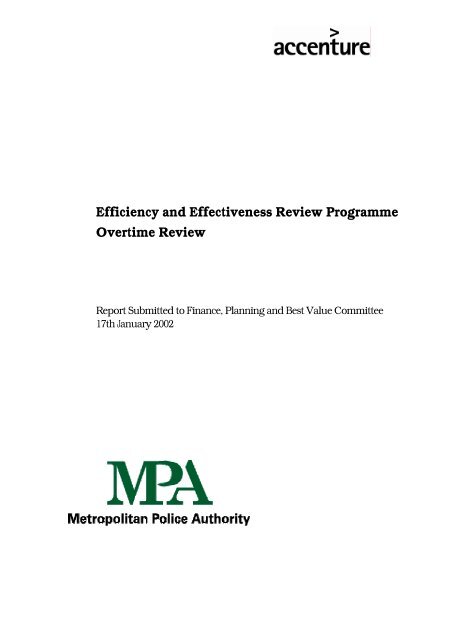
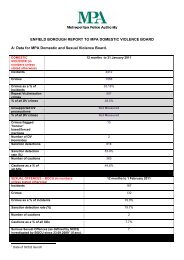
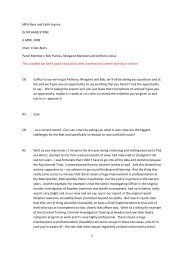
![Appendix 1 [PDF]](https://img.yumpu.com/51078997/1/184x260/appendix-1-pdf.jpg?quality=85)
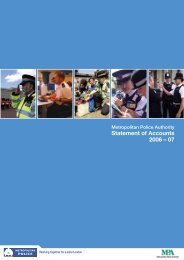
![Transcript of this meeting [PDF]](https://img.yumpu.com/50087310/1/184x260/transcript-of-this-meeting-pdf.jpg?quality=85)
![Street drinking in Hounslow [PDF]](https://img.yumpu.com/49411456/1/184x260/street-drinking-in-hounslow-pdf.jpg?quality=85)
